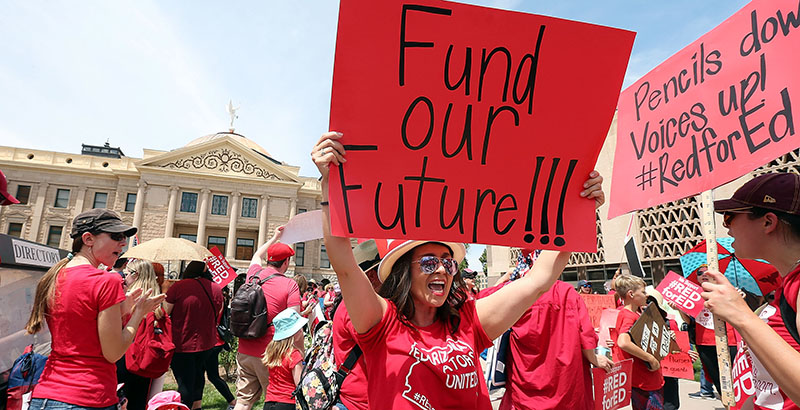‘We’ve Got a Real Crisis’: Half of U.S. Teachers Have Considered Leaving Profession, PDK Poll Finds

Half of the nation’s teachers have seriously considered quitting in recent years, amid concerns about low pay, stress and lack of respect, a new poll finds.
“We’ve got a real crisis going on,” said Joshua P. Starr, CEO of PDK International, the teachers’ professional association that conducts the annual poll. “There’s absolutely a real issue, and we have to confront it nationally if we want to ensure our kids are getting the best possible teachers.”
Teachers who feel undervalued by their community, who say their pay is unfair, who make less than $45,000 annually or who teach high school were more likely to say they’ve considered quitting. The 51st annual poll surveyed 2,389 people online in late April, including 1,083 parents of school-age children and 556 public school teachers.
The result comes after the large-scale “Red for Ed” movement last year that saw teachers in several states strike for higher pay and more education funding.
A majority of teachers surveyed said they would strike for additional funding for school programs, higher pay and more say in school standards, testing and curriculum. A smaller number, 42 percent, would strike for more say in teaching conditions. Even higher percentages of parents would support teachers striking for any of those reasons, the poll found.
Last year’s PDK poll found that for the first time, a majority of parents, 54 percent, would not want their children to become teachers. Similarly, 55 percent of teachers in this year’s poll said they wouldn’t want their own children to follow in their footsteps.
“I work 55 hours a week, have 12 years’ experience and make $43K. I worry and stress daily about my classroom prep work and kids. I am a fool to do this job,” one of the surveyed teachers said in an online focus group.
Pay is a big issue for teachers — 60 percent feel their pay is unfair, the poll found. But so too is the overall climate of schools, including an emphasis on standardized tests, Starr argued.
The challenge for policymakers is to understand that progress is important, without accepting lower standards, Starr said.
“The blunt instrument of an absolute score on a standardized test at the end of the year, it does a disservice to the profession,” he added.
The poll found that 94 percent of teachers feel that students’ growth over time is a better way to measure school performance than just the percentage of students who pass a test. Parents and the general public were more split, with about three-quarters saying that growth over time is a better metric than straight proficiency.
Support for mandatory civics, optional Bible classes
The poll also looked at public support for broadening curriculum in new ways, finding majority support for optional Bible classes and mandatory civics.
Starr said the results reflect a desire to see schools serve a deeper purpose.
“We’ve sort of lost the soul of education in some ways … Schools should be the place where we have dialogue in very diverse communities. That’s more important now than ever,” he said.
Just 6 percent of respondents said Bible classes should be required, while 58 percent said they should be offered as an elective. Support was higher among respondents who identified as evangelical Christians, Republicans or conservatives.
President Trump earlier this year spurred discussion of Bible classes, as several states considered legislation to adopt them as electives in high schools.
Support was much higher for civics, with 70 percent saying it should be required, and another 27 percent saying it should be offered as an elective. Teachers, at 81 percent, were more likely than the general public to say the classes should be required, and parents less likely, at 60 percent.
There are potential hurdles to teaching both: church-state separation issues in a Bible class, and allegations of political bias in civics.
But there are teachers who manage to walk those lines effectively, Starr said: “I think that our results show that people are thirsting for it. We just kind of have to rise to the occasion.”
Disclosure: Carnegie Corporation of New York provided financial support for this survey and for The 74.
Get stories like these delivered straight to your inbox. Sign up for The 74 Newsletter

;)
